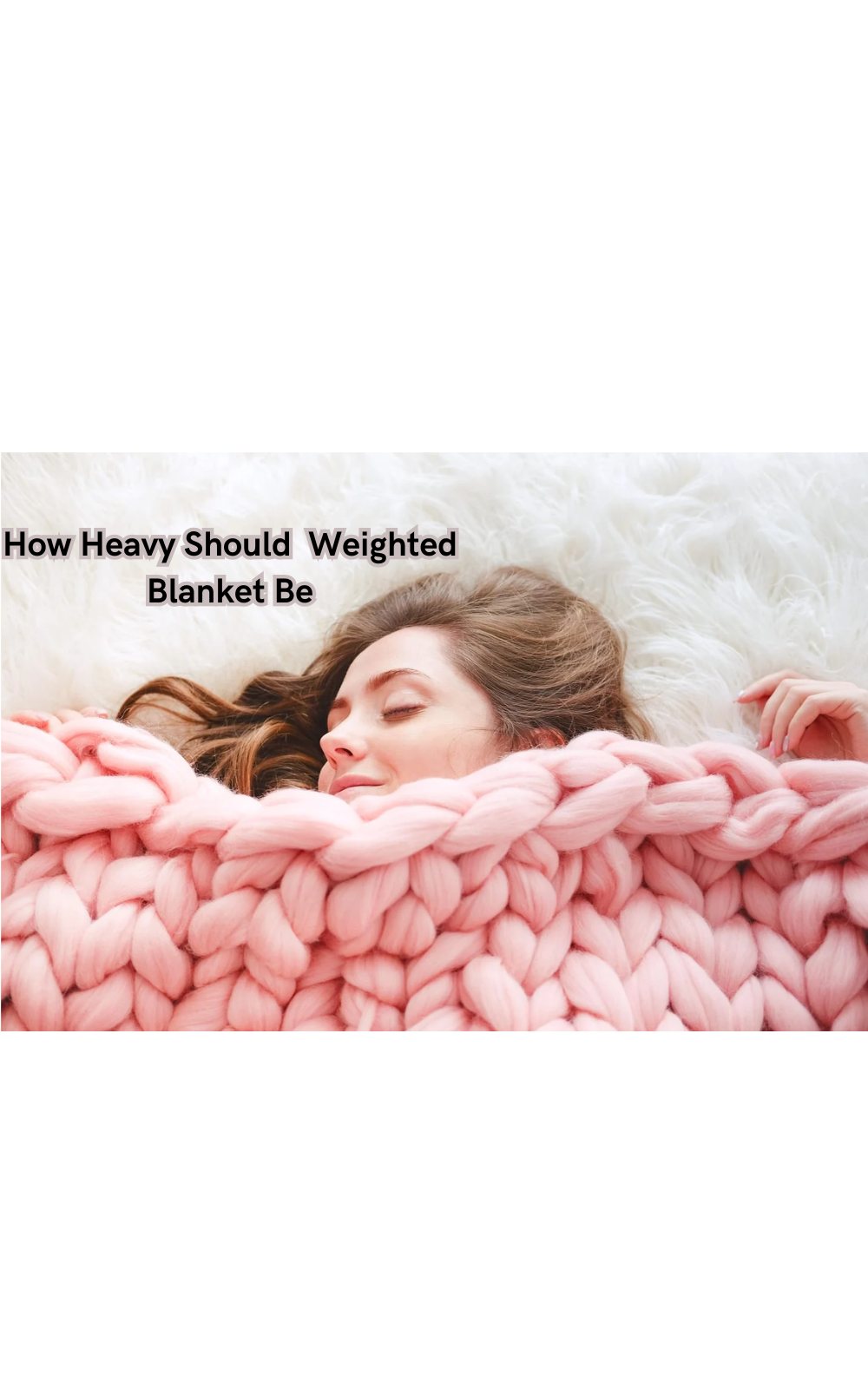How Heavy Should a Weighted Blanket Be
Understanding your preferences and considering factors like body size and sensitivity can help determine the optimal weight for a restful night's sleep.

When choosing the right weight for a weighted blanket, finding the perfect balance is key to maximizing its effectiveness. The ideal weight of a weighted blanket typically ranges from 7% to 12% of the user's body weight.
This range provides gentle, evenly distributed pressure that promotes relaxation and a sense of security. Selecting a too-heavy blanket can cause discomfort or restrict movement, while opting for one that is too light may not provide the desired calming effect.
Understanding your preferences and considering factors like body size and sensitivity can help determine the optimal weight for a restful night's sleep.
What Is a Weighted Blanket?
A weighted blanket is a therapeutic tool to promote relaxation and improve sleep quality. It consists of an outer layer filled with evenly distributed weights such as glass beads, plastic pellets, or natural materials like rice or beans. The added weight creates deep pressure stimulation (DPS) that can have a calming effect on the body and nervous system.
Weighted blankets have gained popularity in recent years for their use in managing conditions like anxiety, insomnia, and ADHD. They are also commonly used by individuals seeking a more comfortable and restful sleep experience.
Deep pressure therapy has been found to increase the production of serotonin and melatonin, hormones associated with relaxation and sleep. Most weighted blankets come in various sizes and weights to accommodate different body types and preferences. A person's body weight is a key factor in choosing the right weighted blanket.
Factors to Consider When Choosing Weight
As mentioned, the recommended weight range for a weighted blanket is 7% to 12% of the user's body weight. However, there are additional factors to consider when selecting the perfect weight for your blanket.
Body Size and Sensitivity
Body size and sensitivity play a crucial role in determining the right weight for a weighted blanket. Generally, individuals with smaller frames may benefit from a blanket on the lower end of the recommended weight range, while those with larger frames may find more comfort with a heavier blanket.
Sensitivity also plays a significant role in weight selection. If you have heightened sensitivity to touch or pressure, it may be best to opt for a lighter weighted blanket to avoid discomfort.
Purpose and Preference
When choosing a weighted blanket, it is essential to consider its intended purpose. If you are using the blanket for therapeutic reasons, such as managing anxiety or insomnia, it may be best to select a weight closer to the higher end of the recommended range.
Restless leg syndrome can also benefit from a slightly heavier blanket. On the other hand, if you simply want a more comfortable sleep experience, a lighter-weighted blanket may be sufficient.
Personal preference also plays a significant role in weight selection. Some individuals may find a heavier weight more comforting, while others may prefer a lighter touch. Sleep apnea or respiratory issues may also impact weight preference, as a lighter weighted blanket can be less restrictive.
Age and Developmental Stage
The recommended weight range for weighted blankets is based on the average adult body weight. Children and adolescents may benefit from a lower percentage of their body weight due to their smaller size and developmental stage.
Choose lighter blankets for children and opt for evenly distributed weight for all weighted blankets.
It is crucial to consult with a medical professional or follow age-specific guidelines when selecting a weighted blanket for children. Heavier weighted blanket is not recommended for children under the age of two, and caution should be taken with all children to ensure safe use.
Weight Distribution
The distribution of weight within the blanket can also impact its overall effectiveness. Some blankets have evenly distributed weights sewn into small pockets, while others have larger sections with multiple layers of filling. Research suggests that evenly distributed weight provides more significant benefits than concentrated weight in specific areas.
Weighted blanket weight distribution can also affect its durability, as uneven weight distribution can lead to shifting and clumping over time. Weighted blankets weigh more than regular blankets, so it is essential to make sure the blanket's weight is evenly distributed for optimal use and longevity.
These factors should be considered along with the recommended weight range when choosing a weighted blanket. Personal preferences and individual needs may vary, so it may take some trial and error to find the perfect weight for you.
How Heavy Should a Weighted Blanket Be for You?
Now that you understand the recommended weight range and factors to consider, it's time to determine how heavy your weighted blanket should be. Here are a few steps to help you find the perfect weight for your needs:
- Calculate 7% to 12% of your body weight.
- Try different weights within this range to see what feels most comfortable.
- Consider any additional factors like body size, sensitivity, purpose, and preference.
- Consult with a medical professional if using the blanket for therapeutic reasons or for children.
- Make sure the weight distribution is evenly spread throughout the blanket.
By following these steps and considering personal factors, you can find the ideal weight for your weighted blanket and enjoy its many benefits. In the next session, watch a general chart to determine the right weight. Let's dive into it.
Weighted Blanket Weight Chart
Here is a general weight chart that can help guide you in selecting the ideal weight for your weighted blanket based on body weight:
| Body Weight | Recommended Weighted Blanket Weight |
| --- | --- |
| 50-70 lbs | 5 - 7 lb |
| 70-90 lbs | 6 - 9 lb |
| 90-120 lbs | 9 - 12 lb |
| 120-150 lbs | 11 -15 lb |
| 150-190 lbs | 14 -20 lb |
| Over 190 lbs | 16+ lb |
It is important to note that this chart is a general guideline and should not be taken as the definitive answer. Personal preferences, sensitivity, and other factors should also be considered when choosing the optimal weight for your weighted blanket. Ideal weighted blanket weight may vary from person to person, and it may take some trial and error to find the perfect weight for your needs.
Weighted Blanket Safety Precautions
While weighted blankets have many benefits, taking safety precautions when using them is essential. Here are a few things to keep in mind:
- Do not use a weighted blanket on infants or children under two years of age.
- Always consult with a medical professional before using a weighted blanket for therapeutic purposes or for children.
- Make sure the weight of the blanket is evenly distributed for optimal use and safety.
- Avoid using a weighted blanket that is too heavy for your body size or sensitivity level, as it may cause discomfort or difficulty breathing.
- If you experience any discomfort or pain while using a weighted blanket, discontinue use and consult with a medical professional.
By taking these precautions, you can safely enjoy the benefits of a weighted blanket without any adverse effects. Fall asleep with peace of mind and wake up feeling well-rested and refreshed. Remember safety first when it comes to using a weighted blanket for both children and adults.
Why You Should Stay Under 35 Pounds
It's essential to note that the recommended weight range for weighted blankets is typically under 35 pounds.
This weight range is based on research and guidelines from medical professionals, ensuring safe use of the blanket for both therapeutic and general purposes.
Weighted blankets above 35 pounds can cause excessive strain on a person's body and may not be suitable for individuals with respiratory or circulatory issues. It is best to stick with the recommended weight range and consult with a medical professional before using a heavier-weighted blanket.
Body weight range and sensitivity should also be considered when determining the ideal weight for a weighted blanket.
Benefits of Weighted Blankets
Weighted blankets have gained popularity in recent years due to their many benefits. Some potential benefits include:
- Improved sleep quality and duration
- Reduced stress, anxiety, and symptoms of PTSD
- Relief from chronic pain and discomfort
- Calmer nervous system and improved mood
- Increased focus and relaxation
While more research is needed to fully understand the effects of weighted blankets, many individuals have reported positive experiences and improvements in their overall well-being.
FAQs
Is a 9kg weighted blanket too heavy?
It depends on your body weight, sensitivity, and preference. A 9kg weighted blanket may be suitable for someone who weighs over 150 pounds but may be too heavy for someone under that weight range.
What weighted blanket for 75kg?
A weighted blanket between 12 and 15 pounds may be suitable for someone who weighs 75kg. However, personal preferences and sensitivities should also be considered. A lighter blanket may be more comfortable for some individuals, while others may prefer a heavier one.
Are weighted blankets hot?
Weighted blankets can feel warm due to the added weight and pressure, but they are not necessarily hot. Many weighted blankets are made with breathable materials to prevent overheating.
Can I wash a weighted blanket?
It depends on the specific blanket's care instructions, but most weighted blankets can be washed in a machine or by hand. It is essential to follow the manufacturer's guidelines to ensure the best care for your weighted blanket.
Conclusion
In conclusion, the weight of a weighted blanket plays a crucial role in its therapeutic benefits and overall comfort.
By adhering to the recommended range of 7% to 12% of your body weight, you can experience the calming effects of deep pressure stimulation without feeling overwhelmed or restricted. Selecting a weighted blanket that aligns with your needs and preferences is essential for optimal relaxation and improved sleep quality.
Keep in mind factors such as body size, sensitivity, and personal comfort levels when determining the right weight for your blanket. Ultimately, finding the perfect balance in weight will help you reap the full benefits of this innovative sleep aid, supporting a peaceful and rejuvenating rest experience.
